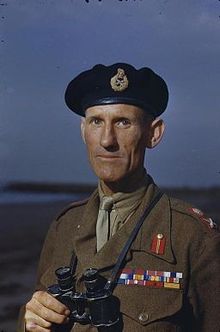Richard McCreery
Sir Richard Loudon McCreery GCB , KBE , DSO , MC (born February 1, 1898 in Market Harborough , Leicestershire ; † October 18, 1967 in Templecombe , Somerset ) was a British Army officer, most recently a general who served as Chief of Staff during World War II General Harold Alexander served in North Africa as well as corps and army commander in the Italian campaign . After the war he was commander of the British troops in occupied Austria until 1946 and then until 1948 commander of the British Army on the Rhine in post-war Germany .
Life
McCreery was born as the eldest son of Walter A. McCreery, an American living in England who competed in polo for the United States at the 1900 Summer Olympics . His mother was a direct descendant of the Scottish inventor John Loudon McAdam . Richard was trained at Eton College and the Royal Military College Sandhurst and joined the 12th Royal Lancers as a second lieutenant in August 1915 . At the turn of the year 1915/16 he came to the front in France and served there, among other things, in the battle of Arras in 1917, in which he was wounded. In the summer of 1918 he returned to the front and fought in the Allies' final offensive until the end of the war and was awarded the Military Cross .
After the war, McCreery served in the Irish War of Independence and was appointed adjutant to his regiment in December 1921 . From 1928 to 1929 he attended the course at Staff College Camberley and was then brigade major of the 2nd Cavalry Brigade. From 1935 to 1938 he commanded the 12th Lancers, which had been equipped with armored cars instead of horses since 1928 . Until the outbreak of World War II, McCreery then served as a general staff officer in the 1st Division in Aldershot . He went to France in 1939 with the division as part of the British Expeditionary Force , where he distinguished himself in the western campaign . He last commanded a mechanized brigade here and received the Distinguished Service Order for his services . After withdrawing from France, McCreery became General Officer Commanding (GOC) of the newly formed 8th Armored Division in December 1940 .
In March 1942 McCreery was transferred to North Africa, where he worked as chief adviser to Claude Auchinlecks for armored reconnaissance vehicles until August . When Harold Alexander assumed the post of Commander-in-Chief of Middle East Command , McCreery was selected as its chief of staff. He continued to serve in the same capacity under Alexander when he took over the newly established 18th Army Group in the Tunisian campaign in February 1943 . In the summer of 1943 McCreery returned to England, where he was briefly GOC of the VIII Corps . In August he moved to the X Corps in the same capacity , which was to take part in Operation Avalanche , the landing of the 5th US Army near Salerno in September 1943. On August 5, 1943, he was knighted as Knight Commander of the Order of the Bath (KCB) .
In the Italian campaign , McCreery commanded his corps under the American Army Commander Mark W. Clark later in the fighting for the Gustav Line and at the beginning of the Battle of Monte Cassino . In the spring of 1944 the corps came under the command of the Eighth Army under General Oliver Leese , which advanced to the German Goth position after the fall of Rome . In July 1944 McCreery received from King George VI at Arezzo with a delay due to the war . the knighthood associated with his nobility (KCB) received in the previous year . In November 1944 he took over the Eighth Army from Leese and commanded it in the 1945 spring offensive , which led to the surrender of the German forces in Italy and the liberation of northern Italy.
In July 1945 the 8th Army was disbanded and transferred to the British Forces of Occupation in Austria , which McCreery continued to lead. He was also the British representative in the Allied Commission for Austria . On July 5, 1945, he was named Knight Commander of the Order of the British Empire (KBE). In 1946 he succeeded Bernard Montgomery as Commander in Chief of the British Army of the Rhine , which he remained until 1948. His last post was that of a British representative on the United Nations Military Staff Committee before retiring from active service in 1949 with the rank of full general. On this occasion he was raised to the Knight Grand Cross of the Order of the Bath (GCB) on June 9, 1949 .
McCreery retired in Stowell Hill, Somerset. From 1951 to 1961 he was regiment chief of the 12th Royal Lancers or of its successor regiment , the 9th / 12th Royal Lancers .
literature
- Richard Mead: The Last Great Cavalryman: The Life of General Sir Richard McCreery, Commander Eighth Army. Pen & Sword, 2012, ISBN 978-1-84884-465-0 .
Web links
- Career data and finding aids in the Liddell Hart Military Archives , King's College London
- Sound recording by Richard McCreery in the archive of the Austrian Media Library
Individual evidence
- ↑ a b c Knights and Dames: MA – MIF at Leigh Rayment's Peerage
| personal data | |
|---|---|
| SURNAME | McCreery, Richard |
| ALTERNATIVE NAMES | McCreery, Sir Richard Loudon (full name) |
| BRIEF DESCRIPTION | British general in World War II |
| DATE OF BIRTH | February 1, 1898 |
| PLACE OF BIRTH | Market Harborough , Leicestershire |
| DATE OF DEATH | October 18, 1967 |
| Place of death | Templecombe , Somerset |
